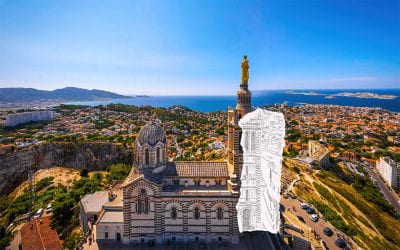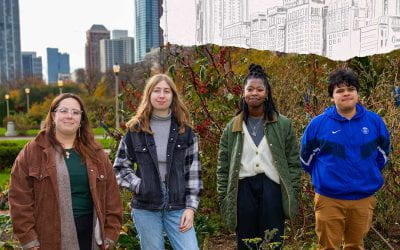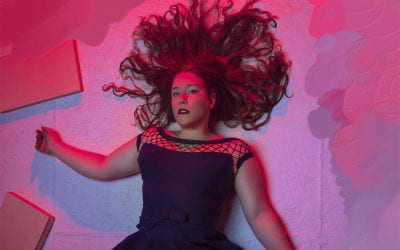creating a new travel niche while wandering the globe
Sharing her first name with one of the world’s great deserts, it was inevitable that Sahara Rose De Vore, BS ’10, (she/her) would find her life’s calling traveling the globe. Her journey from a college graduate, not knowing which way her degree in hospitality and tourism would take her, to launching two successful businesses that help others discover the benefits of travel has developed over time and trips—lots and lots of trips.
Growing up with a single mother in Milwaukee, De Vore’s international travels began when she was a child visiting her grandparents in Canada and Mexico. After graduating high school in 2006, she enrolled at Arizona State University.
“I was never someone who really knew what my career path was going to be. I was good at art and had many interests, but nothing really grabbed me,” she said recently from her home in Milwaukee, which she shares with her husband and new baby.
After moving back to the Midwest her junior year of college to be closer to her mother, De Vore enrolled at Roosevelt, earning a Bachelor of Applied Science (B.A.Sc.) in Hospitality and Tourism Management in 2010.

Sahara Rose De Vore
“I remember being really inspired by the foreign exchange students in adjunct professor Keith Murphy’s International Tourism class,” she said. “The first day of class, he asked us how many countries we had visited, and I couldn’t believe how easily my classmates went to a variety of countries in other parts of the world in a short amount of time.” Listening to them also made her change her mindset about money.
“I was determined to save enough money to take an extended trip somewhere by the time I graduated in two years,” she continued. She cut back on spending and worked several go-getter jobs, including as a server at high-end Chicago restaurants.
At age 22, with money in the bank and degree in hand, De Vore bought a one-way ticket to Ireland where she first stayed with a family friend. “It was a nice buffer on my very first solo trip,” she recalled. “From there, I was on my own.”
She took a train down the southern coast of Ireland, jumped on a ferry to Paris, and explored as much as her Eurail pass allowed before heading home. Upon her return, she had planned to get a job in the hospitality industry. “But I just knew that being in an office every day would not make me happy,” she said.
Like many people in their 20s, De Vore struggled with anxiety and bouts of depression. “A lot of young adults are wondering what to do with their life, which is a lot of pressure. So instead of taking the traditional corporate route, I worked as a server again, saved my money and kept going.”
In early 2011, De Vore bought another one-way ticket. This time to Costa Rica. She picked it because she had done a report on the Central American country for her Spanish class in middle school. “I chose Costa Rica because I love the lush green forestry, birds and animals. I am an artist, and so I like visuals. Costa Rica always seemed very tropical to me, so it was in the back of my mind to see it one day.”

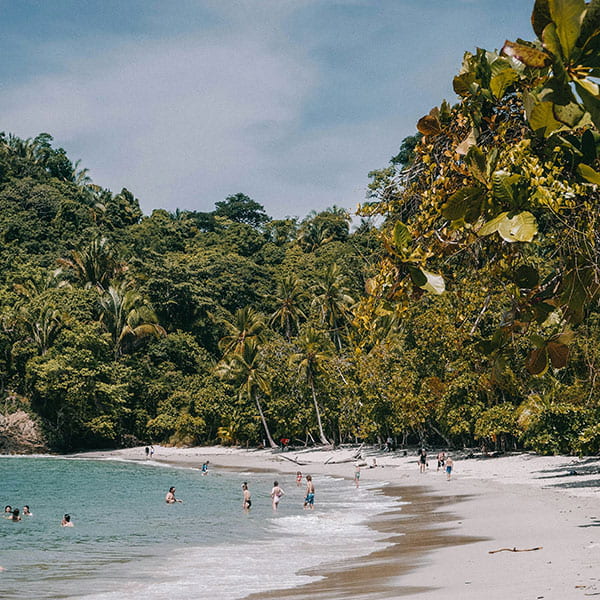
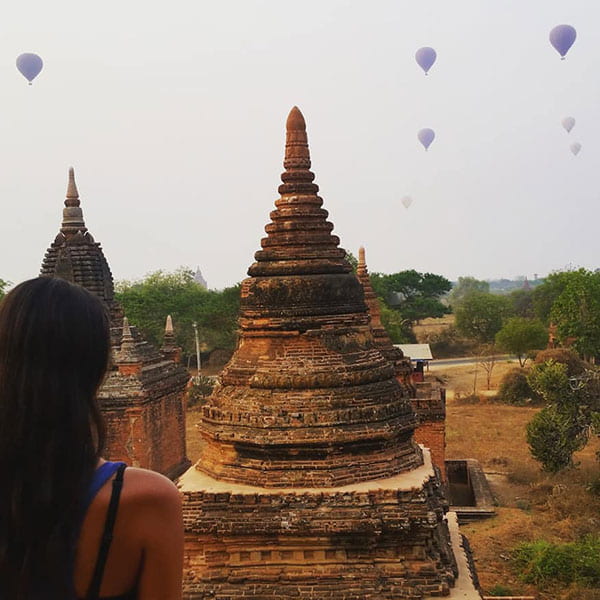
She stayed in hostels, saw the sites, met people and enjoyed the journey. At that time, before travel apps, technologies and platforms were a thing, she used a paper map and a flip phone to get around. She would book a room to her next destination on the one-and-only available couch-surfing website; from there, she’d find the local bus station and hop one to her next destination. “I wasn’t a planner, so I never had a game plan. Without a set itinerary, I was open to hearing about the next great place to visit from the person in the bunk bed below me.”
And off she would go.
Over the next 10 years, De Vore explored 84 countries. She’s ridden camels in the Saharan desert of Morocco. She’s watched hot air balloons rise above the temples of Bagan in Myanmar. She’s trekked from Cusco all the way to the top of Machu Picchu in Peru, and she’s wandered the rice fields of Bali, Indonesia.
During that time, her philosophy about the benefits of travel for self-discovery was forming. “Initially, because I was in search of finding myself and figuring out just what made me happy, a set itinerary wouldn’t have necessarily led me to those goals. I was on a journey of self-discovery, and that meant I had to be open to the experience itself. Without a timeline or a set date to return home, I was able to just go with the flow and stay longer if I liked a place or leave earlier if I didn’t.”
And so, what initially was intended to be a six-week backpacking trip through Europe ended up continuing off and on for the next 10 years as De Vore discovered the meaning and joy of experiencing new people, cultures and places.
The process of her self-discovery evolved with each new place or new person she encountered. Her journeys served as a source of reflection and shaped her identity as a socially conscious global citizen.
When she first began traveling solo, she would sometimes get a sinking feeling in her gut because she didn’t speak the language and wasn’t sure what others were saying as they’d glance her way. “I’d start to feel out of place … out of my comfort zone,” she recalled. At times, she’d even get a sense of worry, fear and intimidation.
On being ‘the outsider’
“That’s how being in a foreign place can make you feel, like you’re the outsider,” she said in a recent TEDx Talk at Carroll University. “But over time, those feelings do go away because travel helps us become more accepting, understanding and trusting of others.”
Everyone is on their own journey, and De Vore believes that everything happens when it is meant to happen. “Oftentimes, we try to dictate what and when things occur in our lives, but in reality, we’re given what we’re given when it’s supposed to be given.”
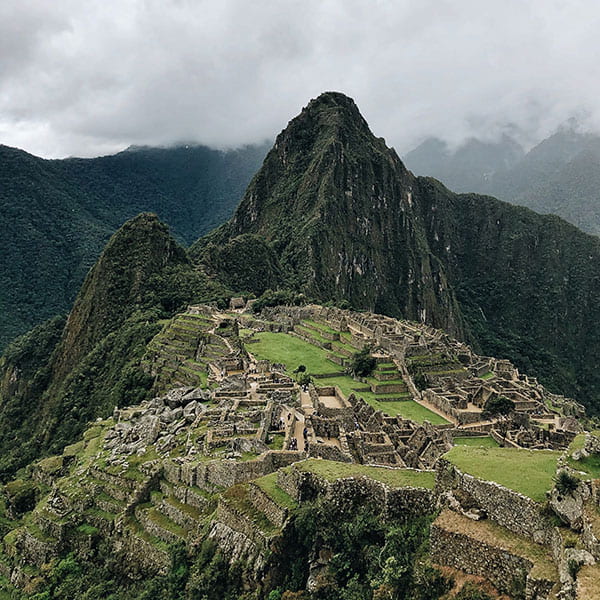
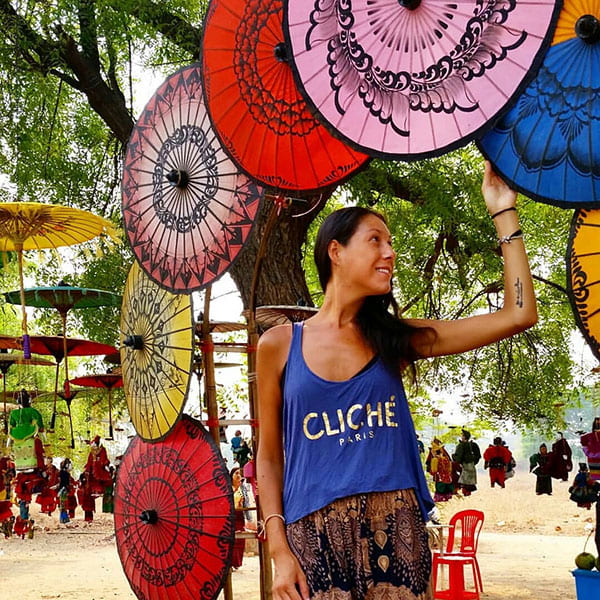
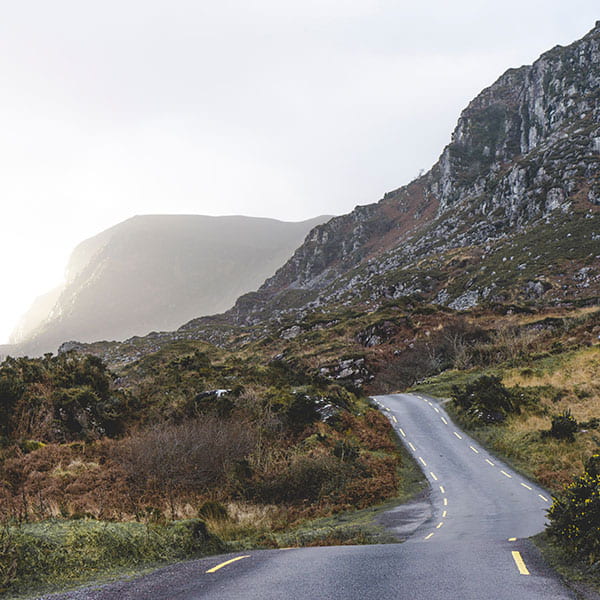
As De Vore traveled the globe, social media was widening its reach and high-speed trains and planes were making travel more accessible. She found herself both in the trenches and in the vanguard of the new travel industry. She also met people who were shaping the emerging travel-related fields, including travel bloggers, writers and influencers, technology users and creators, and digital nomads, among others. She also tracked travel-industry organizations representing different niches that she had first learned about in class.
Even though she was in the middle of it all, she was not finding a career path that spoke to her. “I was searching for, but not finding, a position that aligned with what I wanted to do with my knowledge and experience in travel,” she said. “So, as I was approaching my 30th birthday, I remember sitting in a hostel in Bilbao, Spain, with my little laptop computer. I started googling ‘How to start an online business,’ and ‘What are online travel jobs?’ I was absorbing as much information as possible and trying to come up with different ideas. I didn’t know what I wanted to do. That is when I came across the emerging coaching industry—business coaches, life coaches, health coaches. Something clicked inside of me, and I said, ‘I want to be a travel coach.’ I didn’t know what that meant, but my mission became figuring out what that looked like for myself.”
Because she had met so many people on her travels who were quitting the 9-to-5 to see the world, she became interested in understanding why companies were not valuing travel for their employees. “It became like a tag line. You saw it everywhere online, ‘Quit the corporate job to travel.’ ‘Quit the 9-to 5 to travel.’”
She spent the next year researching corporate-wellness vacation policies, the mind-body benefits of travel, corporate burnout, business-travel burnout. She found a lot of evidence on the benefits of travel—mentally, emotionally, physically and spiritually. She wondered why businesses were not using that information to benefit their employees—both those who were on the road for work and those who worked in one place. So, in 2018, De Vore founded the WTTM Consulting Group, which stands for Wellness, Travel, Tech & Marketing Consulting.
When De Vore started posting online about her travel coaching business, other travelers reached out to her asking, “What’s a travel coach? How do you become one? Where can I learn about it?” Something clicked inside of her again, and she decided to start the Travel Coach Network in early 2019, which now is a global platform. She serves as its founder and CEO. Its tagline is “Building the world’s largest database of Certified Travel Coaches who reshape personalized travel experiences.”
According to the Travel Coach Network website, a travel coach “aims to guide, educate, and inspire travelers to make informed decisions, overcome obstacles, and create memorable journeys.” It describes travel coaching as a comprehensive approach that helps travelers achieve their travel goals, which leads to a more satisfying and fulfilling journey and to maximizing their overall travel experience. The site further describes travel coaching as the emotional, spiritual, mental, and intellectual well-being and transformative needs that drive the desire to travel in the first place.
The Travel Coach Network is the first and only International Coach Federation-accredited program that trains, educates, and certifies travel coaches through their Travel Coach Certification Program.

As founder of both businesses, De Vore is an authority on the benefits of travel for mind, body and spirit. She also is a published author and a global and TEDx speaker, who has been interviewed about her travel and business expertise for 175 media outlets, including Forbes, The New York Times, Travel Weekly, Conde Nast Traveler and CNN Travel. She was named one of 2023’s Most Influential Women in Travel by TravelPulse, an industry trade publication.
“I felt restricted by the tourism industry for a long time, but through my adventures, my determination to live a happy and fulfilling life, and listening to my gut, I took an idea and ran with it to build my dream businesses,” she said.
“By embracing travel, we can build happier and more united communities both inside and outside the workplace,” she continued. “Travel teaches us to be more accepting, understanding and trusting of others.
“As humans, I believe we have an innate desire to travel. It fulfills us and brings us joy. It can show us our life purpose and passions, build our character and boost our self-esteem—all of which can improve our mindset, making us happier overall. And when we’re happier with ourselves, we tend to treat others better. We tend to be more open minded about our differences.”
Over the years, De Vore has asked thousands of fellow travelers why they venture away from the comfort of home. “It’s to have new experiences,” she said. “Most people want to try new foods, see new sites, be in new environments and meet new people.” (See related survey for more reasons).
De Vore’s curiosity about the phenomenon has led her to study the effects of travel on mental health and mood changes. The research shows that experiences, not things, increase happiness. “What better way to boost happiness than by immersing oneself in new cultures, new customs, new languages, new places, new foods? All of which require a person to be open and vulnerable to new ways of seeing the world,” she said.
The positive effects of travel on mood come from ever-changing stimuli. “New sights, sounds, smells, sensations all spark different synapses in our brains. It expands our view of the world and understanding of ourselves,” she said.
The feelings of joy and happiness from travel also can be infectious. “There are so many amazing people and cultures around our globe,” she said. “We can feed off their joy and their energy and take those feelings and spread them throughout our community and workplace.”
“Every time we choose to go on a trip, it’s for a reason,” De Vore explained. Travel coaches are the experts who guide you through the entire travel experience, from planning an excursion to the trip itself to helping you frame your thoughts about it afterward. “Coaches help people get to the root of their desired trip so they can experience the feelings, life changes, transformations and outcomes that motivated them to hit the ‘search flights’ button in the first place,” she said.
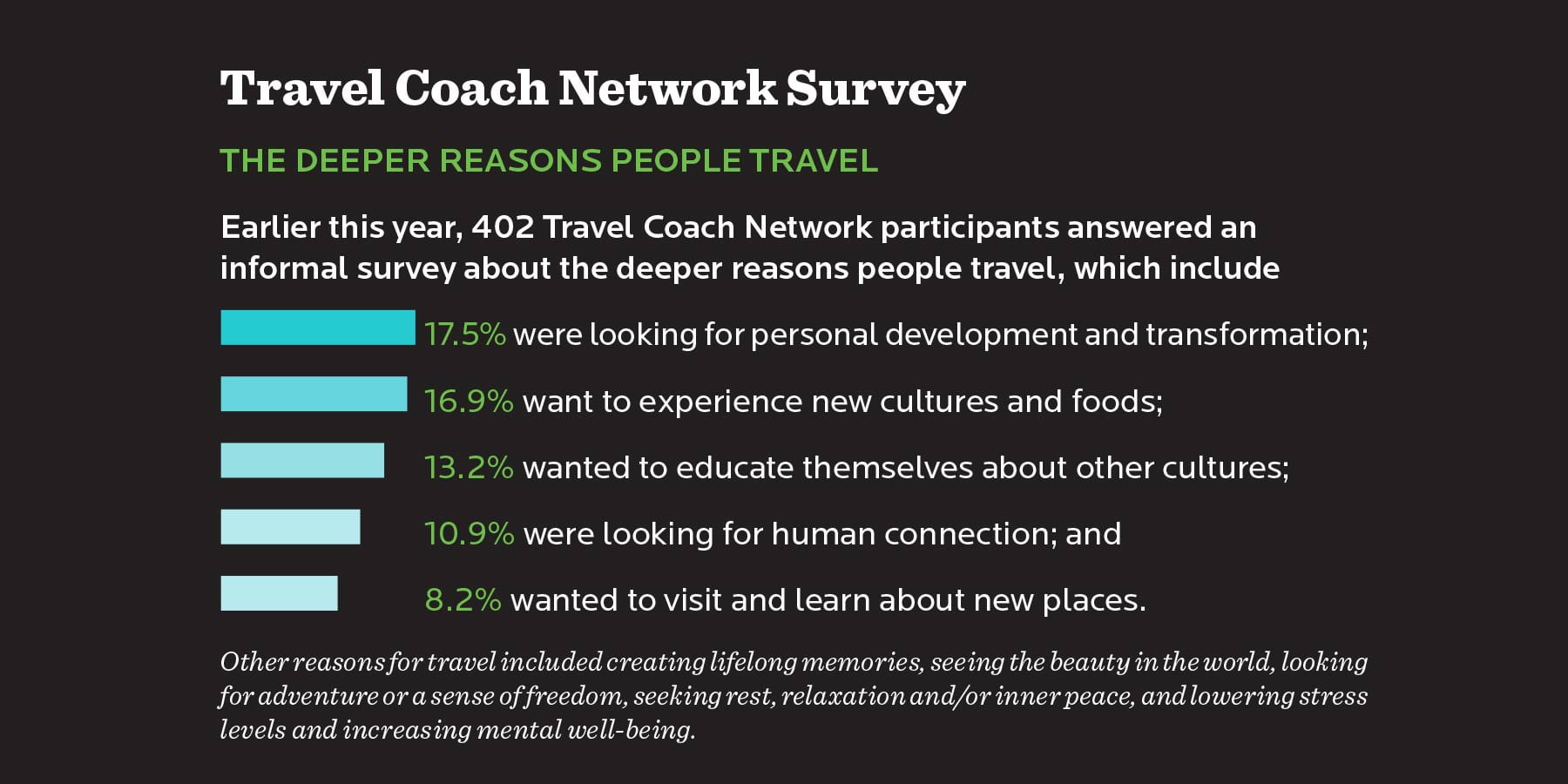
Couple that outcome with a public who, for the most part, spent three years at home during the pandemic, the travel industry is once again flourishing with people wanting to explore. With wanderlust on the rise, along with the realization that we may not always be able to choose when and where we can travel because of outside forces like the recent pandemic, weather-related disasters and geo-political unrest, “There’s a new appreciation for travel’s ability to help us appreciate each other and the world in which we all live,” she said.
Additionally, companies and their employees are seeing the importance of travel and vacations as a way to stave-off workplace burnout. According to the U.S. Travel Association, employee job and employer satisfaction is highly influenced by how much off time is spent traveling.
According to a related study by the Journal of Applied Research Quality of Life, the highest spike in happiness takes place during the planning phase of a trip and can boost happiness for up to eight weeks beforehand.
“The planning of a trip is far more than just itinerary logistics,” De Vore said. “It also comes from talking about the upcoming adventure with loved ones and coworkers. And those conversations also may inspire others to get out of their comfort zone, break free of their daily routines and have their own new travel experiences.
“So, no matter how you decide to travel, where you decide to go or for how long, next time I want you to take time to connect with the locals, to hear their stories and then take all your new perspectives and lessons and apply them to who you are as a member of your community and workplace.
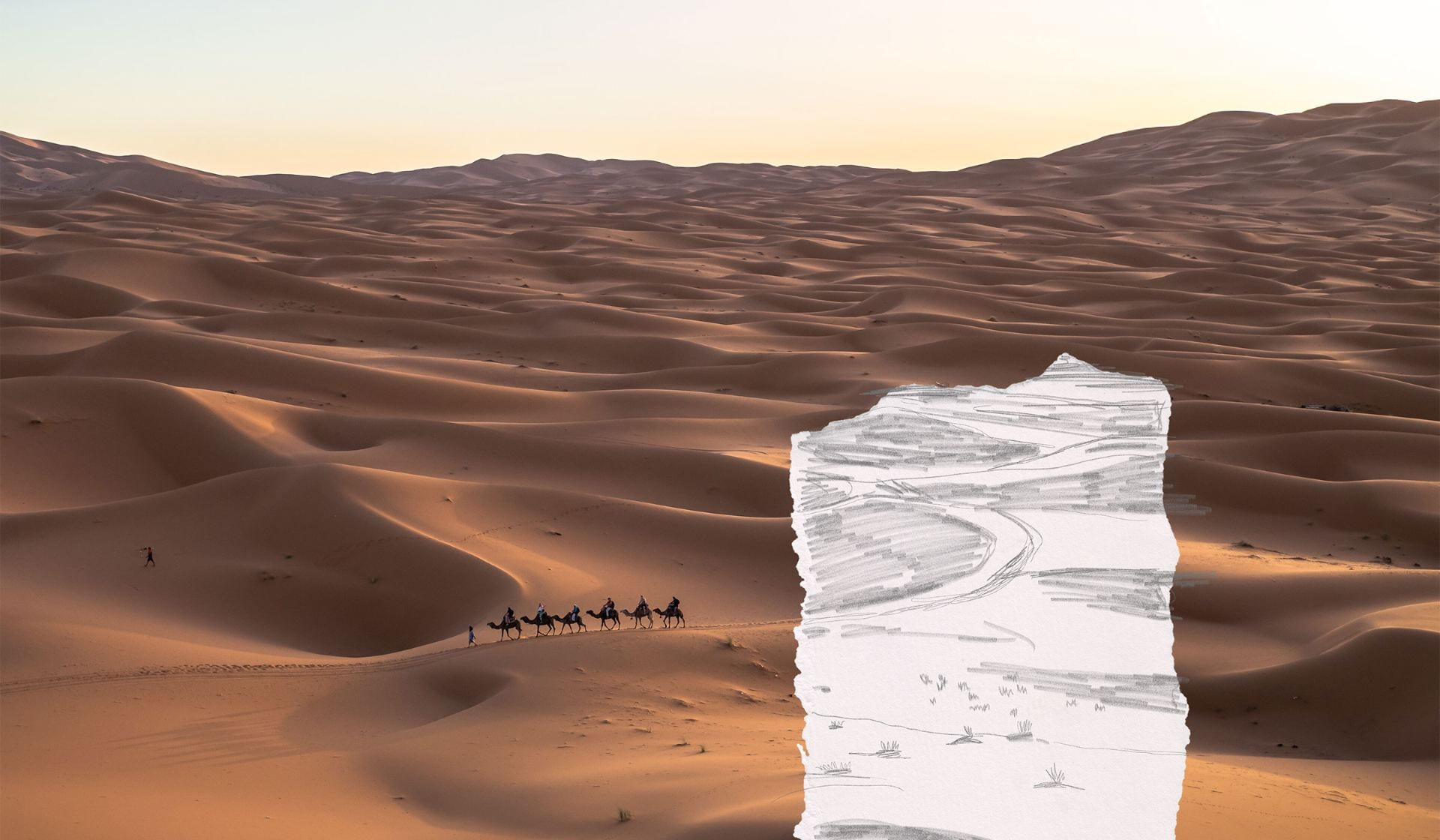
“Travel is such a good way to gain a deeper understanding of one another—of our differences and our similarities,” she said. “Travel can not only lead us to our own path in life, but it also can deepen our empathy and compassion for one another. My work helps people use travel as a tool for reaching personal goals, transformation, healing—or for whatever causes someone to travel in the first place.
“Travel is a way for us to take what we’ve learned from our experiences and apply it to who we are in our family, our workplace, and ultimately, in society when we return home.
I hope when people hear my story—especially Roosevelt students—they use it to always think outside of an industry’s boxes to create the life and career of their dreams.”
Additional photography provided by Unsplash: in order, Camels (Jeff Jewiss), Paris bridge (Léonard Cotte), Beach (Lisa van Vliet), Machu Picchu (Janaya Dasluk), Irish road (Aranka Sinnema), Rice field (Tobias Kaiser)
More in this section
unexcused absence
Some of life’s most important lessons cannot be taught inside the four walls of a classroom. Matthew Beardmore’s travel has forced him to reassess how he thinks about work, family, politics, injustice and many other issues. He’s no longer tied to the beliefs of where he grew up.
traveling while home: self-discovery through the local
How can you make the long trip home if you don’t actually leave there? A partnership between Roosevelt University’s Honors Program and Chicago Architecture Center asks students to experience space and place as sites for action—not simply places we passively inhabit.
Opera’s leading role in transforming gender identity in the arts
Lucia Lucas is a force—both on stage and off. In April, Lucia made history during her debut at the Lyric Opera of Chicago as the first openly transgender person to perform there in a leading role.

